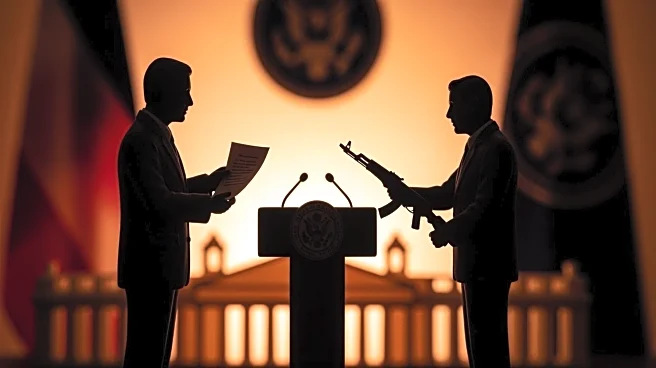What's Happening?
Hamas is under increasing pressure to release the bodies of deceased hostages and disarm as part of ongoing negotiations with Israel. Israeli Prime Minister Benjamin Netanyahu has expressed hope for a peaceful
resolution in the next phase of the deal with Hamas. However, he emphasized that President Trump's conditions are explicit: Hamas must surrender its arms and demilitarize, or face severe consequences. This development comes amid heightened tensions and international scrutiny over Hamas's actions and the broader implications for regional stability.
Why It's Important?
The pressure on Hamas to disarm and release hostages' bodies is significant for several reasons. Firstly, it could lead to a shift in the power dynamics within the region, potentially reducing the threat of armed conflict. Secondly, compliance with these demands may pave the way for more comprehensive peace talks, impacting U.S. foreign policy and its role in Middle Eastern affairs. The situation also affects humanitarian efforts, as the release of hostages' bodies is crucial for closure and justice for affected families. Failure to comply could result in increased military action, affecting regional and global security.
What's Next?
If Hamas agrees to disarm and release the hostages' bodies, it could lead to a new phase of negotiations, potentially involving broader peace talks. Major stakeholders, including the U.S., Israel, and other Middle Eastern countries, will likely monitor the situation closely, ready to respond to any developments. The international community may also increase diplomatic pressure on Hamas to comply, while humanitarian organizations could prepare to assist in the aftermath of any agreement. The outcome of these negotiations will be pivotal in shaping future relations and stability in the region.
Beyond the Headlines
The ethical implications of Hamas's actions are profound, as they involve the treatment of hostages and the responsibilities of armed groups under international law. The situation raises questions about the enforcement of human rights and the role of international bodies in mediating such conflicts. Long-term, this could influence global policies on dealing with non-state actors and the importance of demilitarization in conflict resolution.










